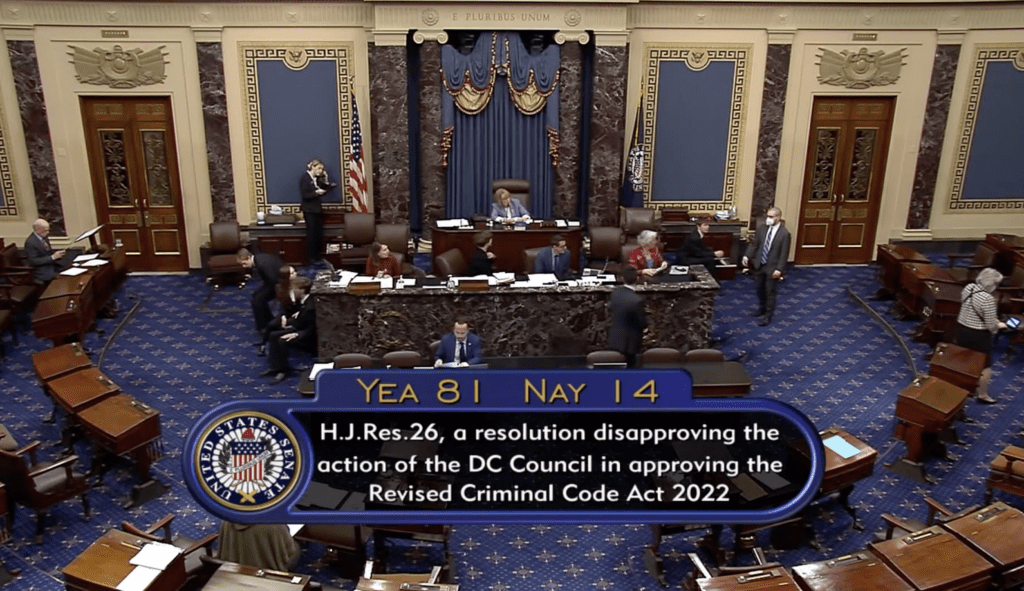On The Hill: Senate Override of D.C. Criminal Code Anti-Climactic
By • March 9, 2023 0 1317

On Wednesday afternoon March 8, this Georgetowner Senior Correspondent drove with some excitement to the U.S. Senate to cover the big D.C. and national story that had seen breathless headlines in the Washington Post and New York Times and on social media for the past several weeks: that the Democratic dominated Senate might vote to disapprove the District’s criminal code overhaul law as the U.S. House did on Feb. 9 – compelling President Biden to either veto their votes or allow Congress to basically overturn a D.C. law passed unanimously by the D.C. Council. The Washington Post headlines often framed the story along the lines of this tag from March 4: “D.C.’s statehood hopes take hit.”
By Wednesday, however, it was a foregone conclusion that the U.S. Senate would pass the “resolution of disapproval” and that President Joe Biden would sign a concurrence. Three Democratic Senators would not be able to vote due to medical reasons (Feinstein-Calif.; Fetterman-Penn. and Carper-Del.) which wiped out the three-vote majority the Senate Democrats tenuously held. The question by Wednesday morning was how big might a Democratic margin be to support Senate Republicans against the D.C. overhaul — and against D.C. Statehood, according to some protestors who gathered in the park between the Senate office buildings and Union Station. That was the drama driving the debate in the Senate before the vote and the cause of excitement for witnesses to the moment.
But it turns out, the whole Senate event was a letdown.
The total vote, as everyone knows by now, was 81-14 in favor of the disapproval resolution with one Democratic senator (Warnock-Ga.) voting “Present” and one Republican (Risch-Idaho) an unexplained no show. The vote marks the first time a D.C. law has been voted down by the U.S. Senate in 30 years.
The vote was postponed from 5:15 p.m. to finally about 7 p.m. Fewer than ten reporters were prowling the press gallery and almost none at their desks. Almost no Senator voted when their name was called during the roll call (usual in the Senate) but unusually almost all just scurried into the chamber, caught the senate vote-counter’s eye and voted with their thumb “Yea” or “Nay,” then left, not staying to socialize. Some, like Sen. Charles Grassley (R-Iowa) voted from the north doorway leaning on a cane. Almost no Democrat sat or stayed to chat – the seats on the Democratic side of the chamber remained empty. Busy taking notes, this reporter missed the brief appearance of Senate leader Schumer (N.Y.) who voted for the resolution of disapproval and Warren (D-Mass.) who voted against it.
For the record, the Democrats who voted “No” on the resolution (and in favor of statehood over safety, according to some) were: Booker, Cardin, Duckworth, Durban, Hickenlooper, Markey, Merkley, Murphy, Reid, Sanders, Van Hollen, Warren, Welch, and Whitehouse. The Hart Office building exits were closed by 8:30 p.m. – “everyone has left,” said the Capitol police officer guarding the doors.
The press barely covered these dry facts the next day. “Violent night as Senate nixes bill,” read the Washington Post metro headline on March 9. The front page of the Washington Post showed a photo of a few protestors by Union Station. “Residents protest, senators debate, D.C. crime code is turned away,” read the headline. The New York Times on March 9 had a short story on page A18.

